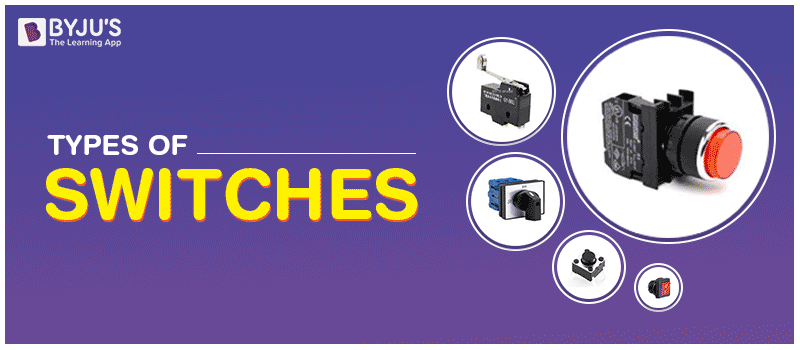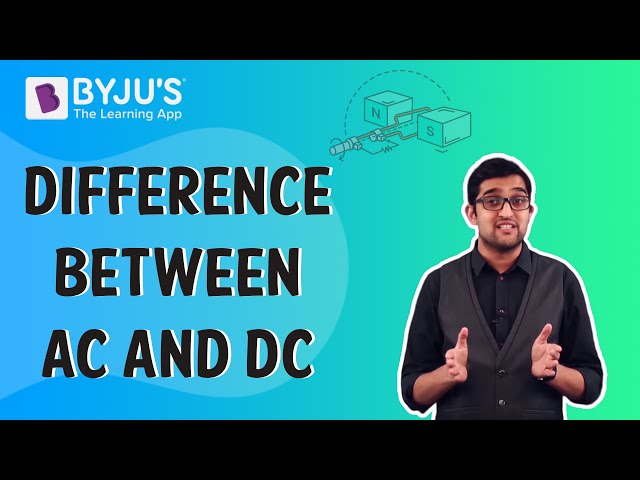What Is a Switch?
A switch is an electrical component that is used to turn on and turn off any equipment like a television, washing machine, lights, fans, etc. When the switch is off, the circuit is open, and there is no flow of current. The current will flow when the circuit is closed, which means that the switch should be on.
Generally, there are two types of switches that are used in an electrical circuit:
-
- Electrical switches: These work under the influence of semiconductors
- Mechanical switches: These require manual contact with the switch for operation and are classified into various types depending upon the poles (no.of input circuit available to the switch) and throws (no.of path for the flow of current available to the switch).

Types of Electrical Switches
| Bipolar Transistors |
| Power Diode |
| MOSFET |
| IGBT |
| SCR |
| TRIAC |
| DIAC |
| Gate Turn-Off Thyristor |
Bipolar Transistors
The working of a transistor is similar to that of a normal switch. The active region of the transistor is not used for switching applications. When the transistor works in the saturation region, it is on and when it works in the cut-off region, it is off. For NPN and PNP transistor, base current needs to be supplied to operate as a switch when it is on.
Power Diode
Silicon is used for the construction of the power diode. When the PN junction of the power diode is forward biased, it acts as switch on and when the PN junction is reverse biased, it acts as switch off.
MOSFET
MOSFET stands for Metal Oxide Semiconductor Field Effect Transistor which is a unipolar switching device. It consists of three terminals: drain (output), source (common), and gate (input). As the device is voltage controlled, the on and off state of the device can be determined by controlling the input voltage and resistance across the drain and the source.
Types of Mechanical Switches
| Single Pole Single Throw |
| Single Pole Double Throw |
| Double Pole Single Throw |
| Double Pole Double Throw |
| Two Poles Six Throw |
| Momentary control switches |
Further Momentary control switches can be divided as:
- Push-button
- Pressure switch
- Temperature switch
- Toggle switch
- Rotary switch
Single Pole Single Throw
This is the simplest example of a switch and has one input terminal called the pole and one output terminal called throw. This switch is used in a single loop or one closed path.
Single Pole Double Throw
It has one input terminal and two output terminals and can also be used as a selector switch which means we can supply current to two loops.
Double Pole Single Throw
These are used to control the two circuits at the same time. It has two input terminals and two output terminals. In these types of circuits, the two switches are connected with a single lever and operate at the same time.
Double Pole Double Throw
This consists of six terminals, two input terminals(poles), and four output terminals(throw), two for a terminal for each pole. In this, one pair of output (throw) is connected with two terminal of input (pole).
Two Pole Six Throw
It has one input terminal (pole) and six output terminal (throw) for each pole. That means a total of 12 output terminal. This is used for changing over features for the same input terminals in the circuit.
Push Button Switch
When it is pressed, the circuit gets closed for the flow of current. When pressure is removed from the switch, the contact is broken and the flow of current is stopped.
Read More: Electrical Circuit
Pressure Switch
This is used to increase or decrease pressure from a set point. It consists of a C-shaped diaphragm and is used in industries to sense the pressure of air, water, or oil.
Temperature Switch
This consists of a resistance temperature device that senses temperature and is operated according to the value of measuring temperature.
Toggle Switch
This has a lever which is moved up and down for turning ON and OFF and is used for household applications.
Rotary Switch
This switch is pretty much self-explanatory and is used in channel selector or range selector or band selector. Here, a switch is used to connect one line to one among many lines.
Watch the video and explore the difference between AC and DC

Stay tuned to BYJU’S and Fall in Love with Learning!

Comments